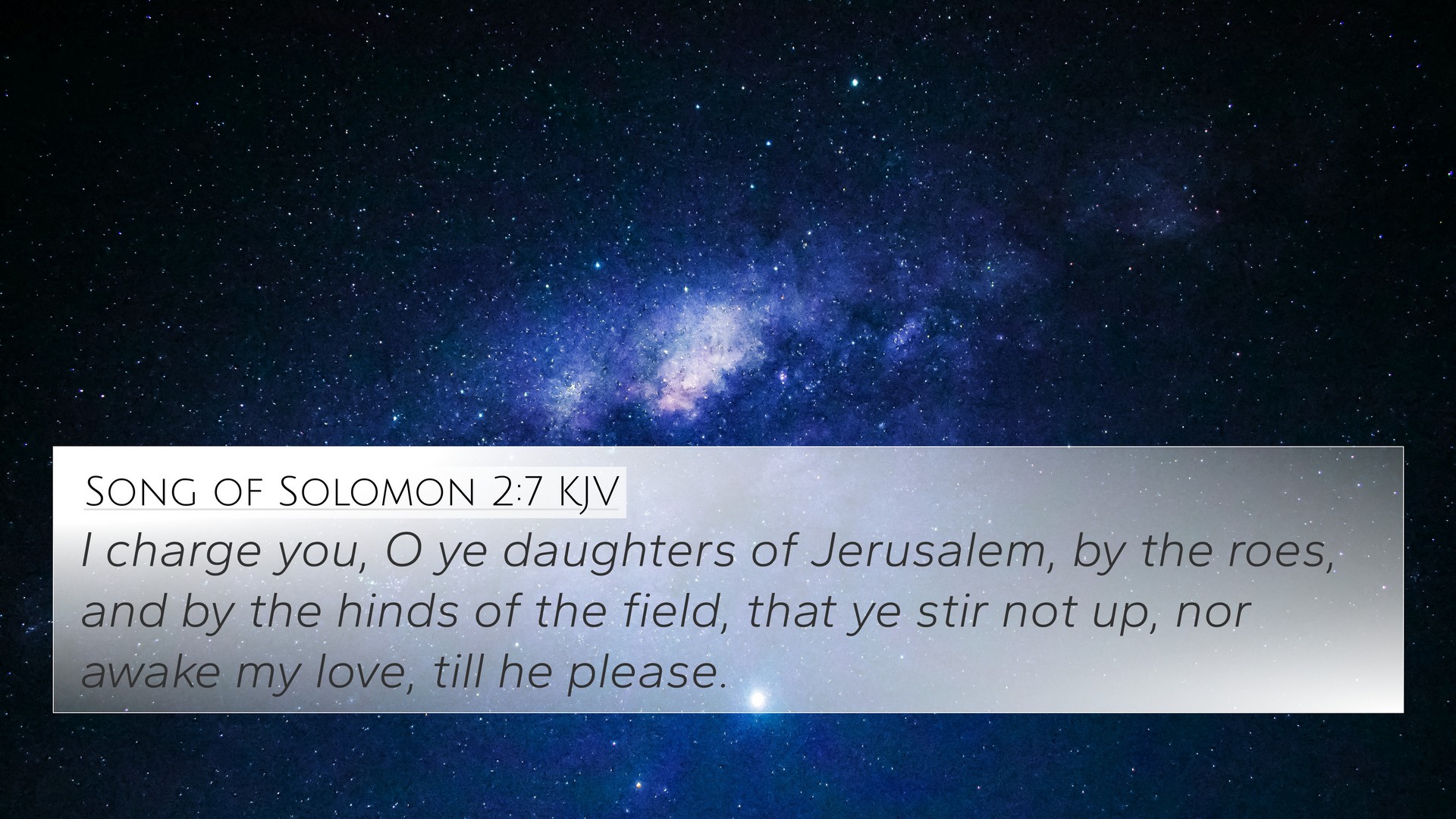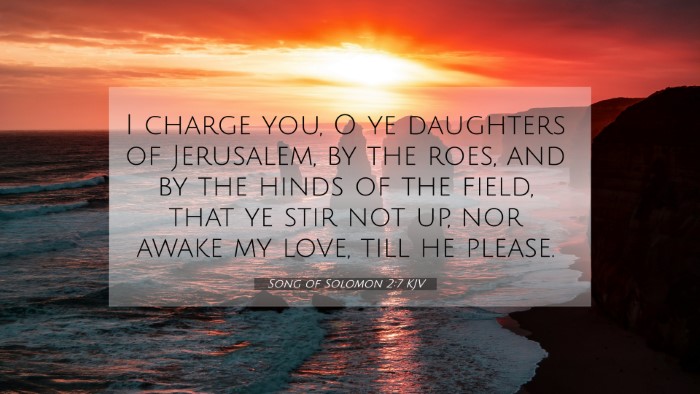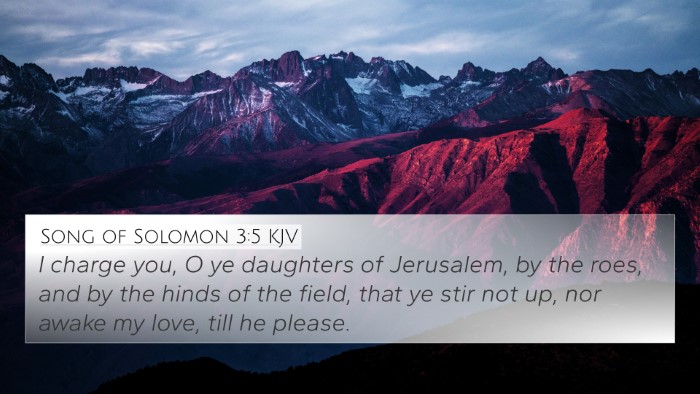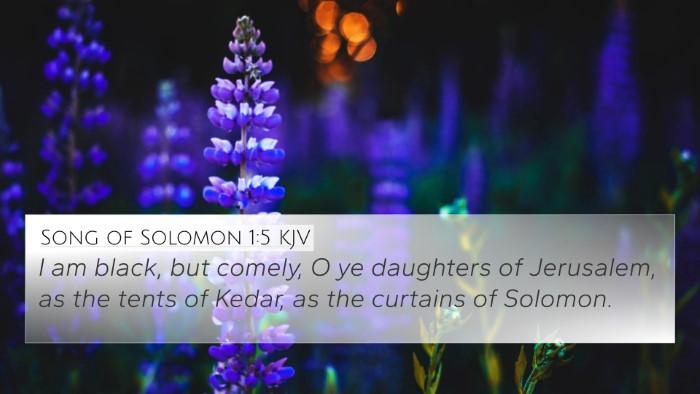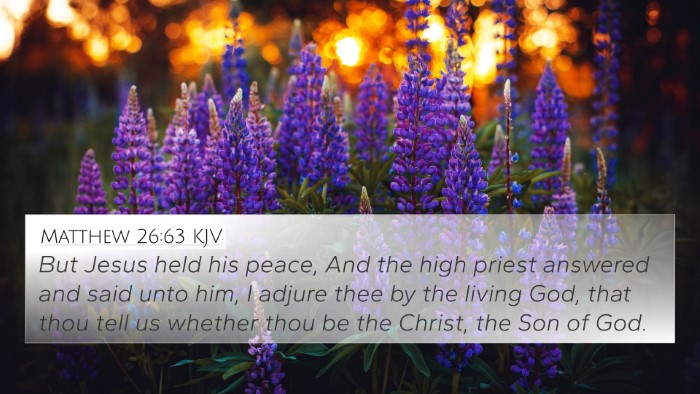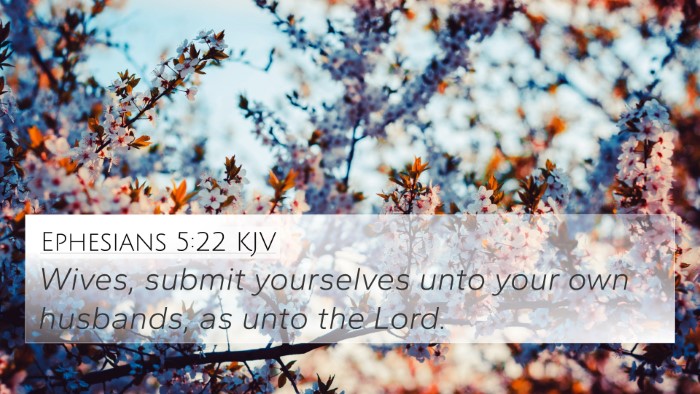Understanding Song of Solomon 2:7
The verse Song of Solomon 2:7 states:
"I charge you, O ye daughters of Jerusalem, by the roes, and by the hinds of the field, that ye stir not up, nor awake my love, till he please."
This verse is rich in poetic imagery and carries significant thematic depth, invoking the ideas of love, desire, and patience within romantic relationships. Below is a summary of insights from various public domain commentaries, woven together to provide a comprehensive understanding of this verse.
Main Themes and Interpretations
-
Charge to the Daughters of Jerusalem:
The speaker addresses the "daughters of Jerusalem," which symbolizes the collective community and its influence on romantic relationships. The speaker implores them not to disrupt a precious love by awakening it prematurely. Matthew Henry suggests that this serves as a counsel for both protection and respect for love's timing.
-
Symbolism of the Roes and Hinds:
The mention of roes and hinds represents gracefulness, beauty, and the gentleness of love. This symbolism is expanded by Albert Barnes, who notes that these creatures move swiftly and softly, reflecting the tender and delicate nature of romantic feelings that should not be forced or rushed.
-
The Nature of Love:
The core message emphasizes the importance of not stirring up love until it is time. Adam Clarke elaborates on this idea, indicating that love, like nature, must unfold in its own time and pace. This mirrors God's design for emotional and romantic experiences, advocating for patience and respect.
-
Desire and Longing:
The verse speaks to the deep-seated desires within each person, challenging them to remain steadfast in their patience. This reflects a powerful dynamic in relationships where the right timing is crucial for real intimacy and connection.
-
The Role of Community:
The explicit mention of the daughters' role emphasizes the importance of community in nurturing or hindering romantic bonds. It implies a shared responsibility in respecting the sanctity of love among peers.
-
Comparison to Other Biblical Themes:
This verse calls for inter-Biblical dialogue with other passages that discuss love, such as 1 Corinthians 13:4-7, which addresses love's patience, and Ecclesiastes 3:1, which notes that everything has a season.
Bible Cross-References
Song of Solomon 2:7 resonates with several other Bible verses that explore similar themes of love and patience. Here are some cross-references:
- 1 Corinthians 13:4-7: Discusses the nature of love, emphasizing its patience and protective nature.
- Ecclesiastes 3:1: "To everything, there is a season," supporting the notion of timing in relationships.
- Proverbs 3:5-6: Encourages trust in the Lord’s timing, suggesting that divine intervention plays a role in personal affairs.
- Song of Solomon 8:4: Reinforces the theme of waiting for love's moment: "I charge you, O daughters of Jerusalem, that ye stir not up, nor awake my love, until he please."
- Romans 12:10: Speaks about the genuine affection and honor towards one another, which relates to loving relationships.
- Matthew 6:33: Instructs seeking first the Kingdom of God, emphasizing prioritizing God and His timing in all things.
- Hebrews 13:4: Upholds the sanctity of marriage and love, stressing purity in romantic relationships.
Thematic Connections
Song of Solomon 2:7 intertwines beautifully with the overarching themes of love, commitment, and divine timing in relationships found throughout the Scriptures. This entails:
-
Divine Romance:
This verse reflects God's love for His people, akin to the romantic love depicted in other parts of Scripture, such as in Hosea, where God's unending love for Israel is highlighted.
-
Human Relationships:
Coupled with references in Ephesians 5:25, which speaks of love within marriage, it becomes clear that the principles here apply to all forms of love, not just romantic.
Conclusion
In understanding Song of Solomon 2:7, it is essential to recognize the depth of romantic love and the importance of timing. As we engage with this verse’s meaning, we should explore the connections it has with other biblical verses and themes. Using tools for bible cross-referencing, we can gain a more nuanced interpretation of God's design for love and the relationships we hold dear.
